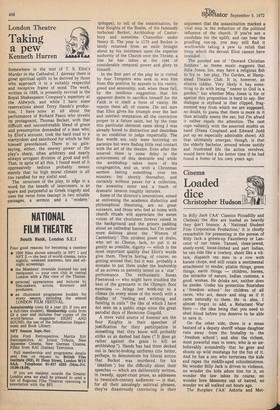London Theatre
Taking a pew
Kenneth Hurren
Somewhere in the text of T. S. Eliot's Murder in the Cathedral, I claresay there is great spiritual uplift to be derived by those who approach it in a suitably respectful and receptive frame of mind. The work, written in 1935, is presently revived in the Royal Shakespeare Company's repertory at the Aldwych, and while I have some reservations about Terry Hands's production, I have none at all about the performance of Richard Pasco who invests its protagonist, Thomas Becket, with that difficult and uncomfortable blend of grace and presumption demanded of a man who, by Eliot's account, took the hard road to a martyrdom and sainthood for which he felt himself preordained. There is no gainsaying, either, the sinewy power of the play's sharp, often arbitrary and nearly always arrogant division of good and evil. That, in spite of all this, I found most of it oppressively tedious probably means merely that its high moral climate is all too rarefied for my sinful soul. The structure of the play, to edge in a word for the benefit of latecomers, is as spare and purposeful as Greek tragedy and uses the verse form (except in two notable passages, a sermon and a ' modern ' epilogue), to tell of the assassination, by four Knights of the Realm, of the famously turbulent Becket, Archbishop of Canter bury and sometime Chancellor under Henry II. The year is 1170 and Becket is lately returned from an exile brought about by his insistence upon the superior authority of the Church over the Throne, a line he has taken at the cost of considerable temporal power and glory to himself.
In the first part of the play he is visited by four Tempters who seek to woo him from t'his position by appeals to his vanity, greed and sensuality, and, when these fail, by the insidious suggestion that his apparent desire to sacrifice himself for the Faith is in itself a form of vanity. He rejects them all, of course. I'm not sure that Eliot gives his triumph over the last and subtlest temptation all the conviction proper to a future saint, but by the time this particular skirmish came along I was already bored to distraction and doubtless in no condition to judge impartially. The fine words not only were buttering no parsnips but were finding little real contact with the art of the theatre. Even after the interval there is some delay in the achievement of this desirable end while the archbishop takes leave of his congregation, and us, with a Christmas sermon lasting something over ten minutes; but shortly thereafter, and certainly without pause for a collection, the assassins enter and a touch of dramatic tension roughly intrudes.
Some of the director's innovations, aimed at enlivening the academic dialectics and philosophical theorising, are no great nuisance, and those who feel at home with churc'h rituals will appreciate the sweet voices of the choristers forever raised in the background and the priests padding about on cathedral business; but I'm rather more dubious about the Women of Canterbury.' This strident posse of drabs, who act as Chorus, lack, to put it as gently as possible, dignity — which is the most important quality that Eliot's words give them. They're boring, of course; no getting around that; but it was probably a mistake to put them under the leadership of an actress so patently intent on a 'star ' performance. The enthusiastic Susan Fleetwood — who might have troubled the best of the gymnasts in the Olympic floor exercises — brings her work-out to a climax (in every sense of the word) with a display of "reeling and writhing and fainting in coils" the like of which I have not seen on a public stage since the great parodial days of Hermione Gingold.
A more valid source of humour are the four Knights in their speeches of justification for their participation in something that they know will probably strike us as dashed bad form (" It does go rather against the grain to kill an archbishop "). Hands has had them decked out in fascist-looking uniforms (the better, perhaps, to demonstrate his liberal notion that Becket was murdered for his ' idealism ') but the difficulty about their speeches — which are deliberately written, in tweedy, upper-crust prose, as addresses to twentieth-century audiences — is that, for all their amusingly satirical phrases, they're disastrously convincing in their argument that the assassination marked a vital step in the reduction of the political influence of the church. If you're not a candidate for the uplift, and can bear the gruelling run-up, you may still find it worthwhile taking a pew to relish that irony which the devout Eliot cannot have intended.
The pointed use of 'Onward Christian Soldiers ' as theme music suggests that Julia Jones, too, may have a religious fish to fry in her play, The Garden, at Hampstead Theatre Club. It is, however, an elusive tiddler. Very likely it has something to do with being "nearer to God in a garden," but whether Miss Jones is for or against this proposition is hard to say. Her dialogue is stylised in that clipped, fragmented way from which we are supposed, no doubt, to guess that there is more in it than actually meets the ear, but I'm afraid it rather repels the attention. The cast cope valiantly with the assorted misfits on hand (Diana Coupland and Edward Judd put up an especially admirable show). All that ultimately emerges, though, is that the elderly bachelor, around whose untidy and frustrated life the action revolves, would have had a far better time if he had found a homo of his own years ago.










































 Previous page
Previous page